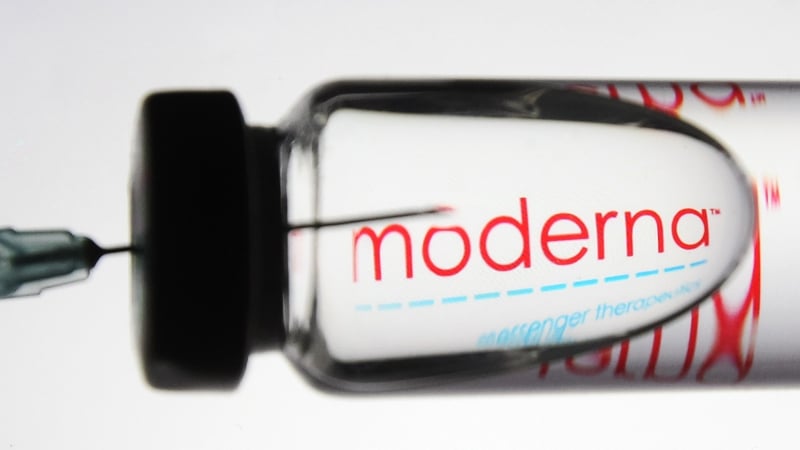Posted on about 4 years ago by Laurentina Kennedy

Moderna to seek US, EU emergency vaccine authorisation

Moderna has said it will apply for US and European emergency authorisation of its Covid-19 vaccine based on full results from a late-stage study showing its vaccine was 94.1% effective with no serious safety concerns.
It also reported a 100% success rate in preventing severe cases. The filing sets Moderna's product up to be the second vaccine likely to receive US emergency use authorisation this year.
"We believe that we have a vaccine that is very highly efficacious. We now have the data to prove it," Moderna Chief Medical Officer Dr Tal Zaks said in a telephone interview. "We expect to be playing a major part in turning around this pandemic."
Dr Zaks said he was emotional after seeing the 94.1% result over the weekend: "It was the first time I allowed myself to cry. At this level of effectiveness, when you just do the math of what it means for the pandemic that's raging around us, it's just overwhelming."
Moderna's announcement follows news from Pfizer and German partner BioNTech that their vaccine, which also uses a new technology called synthetic messenger RNA (mRNA), was 95% effective.
Pfizer has applied for emergency use authorisation, putting it about a week ahead of Moderna.
In addition to filing its US application, Moderna said it would apply for conditional approval from the European Medicines Agency, which has already begun a rolling review of data, and would continue to talk with other regulators conducting rolling reviews.
Moderna's latest efficacy result is slightly lower than an interim analysis released on 16 November of 94.5% effectiveness, a difference that Dr Zaks said is not statistically significant.
Both the Moderna and Pfizer vaccines proved more effective than anticipated and far superior to the 50% benchmark set by the US Food and Drug Administration.
Britain's AstraZeneca has announced an average efficacy rate of 70% for its vaccine and as much as 90% for a subgroup of trial participants who got a half dose first, followed by a full dose. But some scientists have expressed doubts about the robustness of the 90% efficacy figure for the smaller group.
Independent advisers to the US Food and Drug Administration are scheduled to meet on 17 December to review Moderna's trial data and make a recommendation to the FDA. They will meet on 10 December to review Pfizer's data.
Shortly after gaining emergency use authorisation, Moderna expects the vaccine to be shipped to designated distribution points throughout the United States by the government's Operation Warp Speed programme and McKesson Corp, a drug distributor contracted by the U.S. government.
Its distribution is expected to be easier than Pfizer's because while it needs to be stored in a freezer, it does not require the ultra-cold temperature needed by Pfizer's vaccine.
Of the 196 volunteers who contracted Covid-19 in the more than 30,000-person trial, 185 had received a placebo versus 11 who got the vaccine. The company reported 30 severe cases - all in the placebo group - which means the vaccine was 100% effective at preventing severe cases.
The trial included one Covid-19-related death in the placebo group.
Moderna said the vaccine's efficacy was consistent across age, race, ethnicity and gender demographics. The 196 cases included 33 adults over 65 and 42 volunteers from racially diverse groups.
Dr Zaks said the vaccine has been developed during a period of "political acrimony" and having a highly effective vaccine may go a long way toward erasing some of that distrust.
"This is as black and white as an effect on a population will be. Your chances of actually being sick if you've been vaccinated are decreased 20-fold," he said.
Moderna reported no new side effects since its interim analysis on 16 November. Based on that analysis, the most common side effects were fatigue, injection site redness and pain, headache and body aches, which increased after the second dose and were short-lived.
Dr Zaks said the vaccine caused significant flu-like symptoms in some participants, which, he said, "goes hand-in-hand with having such a potent vaccine."
But it has not caused any significant safety concerns so far.
Moderna plans to start a new trial to test the vaccine in adolescents before the end of the year, followed by another rtrial in even younger volunteers early in 2021. The company hopes to have the vaccine available for adolescents by September of next year, Dr Zaks said.
Other vaccine makers have said they are studying their vaccines in young people as well.
Moderna said it was on track to have about 20 million doses of its vaccine ready to ship in the United States by the end of 2020, enough to inoculate 10 million people.